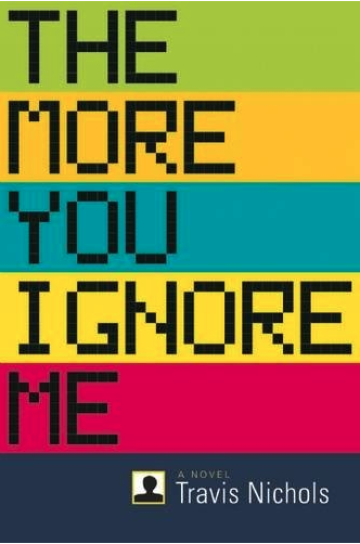THE MORE YOU IGNORE ME by Travis Nichols
“Soon though, it became clear the blog was missing a key element, a sagacity that comes with age that could activate the yeast, as it were, and bring the loaf of true thought into the world. The blog was missing my presence.”
The more we ignore them the more they give us no choice but to know them; little else more quickly embitters the optimistic blog peruser into closing the tab. They are SolipsisTaco3 and KafkaR3born. They are who Travis Nichols describes as “the trolls lurking underneath the bridges” of our day-to-day internet travels and one of their most effusive mouthpieces is the narrator of Nichols's new novel.
The More You Ignore Me (Coffee House Press) is the comments section troll's wet dream realized, his proudest cyber-manifesto in paperback. The narrator of The More You Ignore Me is what many readers might conjure in imagining the face behind a comments section troll's username. Linksys181 is a 40-something, thoroughly asocial “Barnum of the Digital Age” who has “been given the gift of time away from employment.” With this newfound breadth of idle days, Linksys181 “embarks on a few long-delayed projects,” one of which involves rummaging around the internet for his First Love, an oblivious girl he used to stalk passionately in college who he refers to as Rachil. This search quickly proves fruitless and just as the “dark folds” of Linksys181's doubt begin to “smother and choke [him],” he is struck by a “BOLT FROM BEYOND”: a photograph of a campaigning politician, the background of which contains Rachil's doppleganger.
Galvanized by this breath of fresh plot twist, Linksys181 launches into a spell of feverish googling and uncovers the doppleganger's identity--a Film Studies Teaching Associate named Charli Vistons whose Facebook Likes (and “implied dislikes”) irrefutably indicated that she and his long lost Rachil shared a soul. However, just as Linksys181 had dream-driven himself “halfway down the interstate of [his] mind” to Charli's campus--such a pilgrimage being the natural course of action in abiding this omen from “the true structure of reality”--he scrolls smack into the line of fire of a digital “dagger”: a URL posted on Charli's Facebook wall, linking to her wedding blog.Linksys181, as Nichols describes in interviews, is a digital age practitioner of the strain of “anarchy that operates under the guise of law and order;” he would more quickly drain the earth of its oceans than change his ways.
To do so--he believes--would defy the civic mandates fastened to his gift of super human insight, his knack for “examinations of the dark floes [that] illuminate the world for others.” In the case of the wedding blog, Linksys181 (in an acrobatic feat of reason-twisting) concludes that the only fathomable explanation for its existence is that it must be a “gift from the gnosis,” a platform upon which he is destined not only to “facilitate his role within Charli's life” but more momentously, to participate in the revolution for which he had so long been searching.
“On a blog with comments, the writer and the reality mingle to make the words as ever--but outside, on a separate plane the commenter is THERE evaluating the mingling manifestation, weighing veracity and fidelity on the scales of justice.”
Linksys181 spends the rest of the novel fighting what he perceives to be the aforementioned good cyber fight, squabbling tirelessly with the “racist, sexist, classist, ageist Neanderthals” who are the blog's moderators in the name of defending “the grand tradition of online democratic society--rough, fragile experiment that it remains.” Further, he draws absurdly overblown comparisons between his efforts and those of famous visionaries across mediums of world history (the Viet Cong, the Sandinistas, the PLO, Eakins, Roth, Poe, Rockwell, etc).
While this analogizing is transparently (profoundly) delusional (and makes for many a healthy belly-lol), it posts the reader with a troubling collection of questions about the health of American inspiration and initiative. In a culture over-saturated with the online manifestos of stay-at-home “visionaries” who are our Sandinistas, Rothwells, and Poes? How much of a victory for democratic exchange of thought is digital life if the question of where to put the faith paralyzes so many of us with indecision and subsequent inaction?
Nichols gets the reader to ask grave questions amid Linksys181's circus of a blog comment by abruptly humanizing him every now and again. At moments in which the absurdity of his manifesto peaks, and the reader feels smug in the extent to which his/her sensibilities appear to be keeping Linksys181 safely fictional, Nichols bucks the narrative into a sad scene from Linksys181's past. As a precursor to gambling his adult life away in pursuit of impossible romantic fantasies, Linksys181 spent his childhood afternoons in parking lots of casinos and racetracks. His divorced mother bet her paychecks on “dogs that peed before the race” and countless other surefire busts (Linksys181 himself later became addicted to Blackjack for a handful of teenage years).
Also, there is a blink of a scene in which Linksys181 alludes dismissively to having been molested by his father who was otherwise absent, a trauma he vehemently guards: “Couldn't [the court-ordered therapist] see by NOT uncovering the memory, not examining it for clues, leaving it alone in the past, made it all the more interesting?”
With these offline glimpses, it becomes difficult to dismiss Linksys181, and the community of epic internet trolls he represents, as clownishly deluded ascetics. After all, though likely to a degree less desperate, we all use the internet on a daily basis to create idealizing fictions about ourselves and about the relationships we have and could have with others.
The More You Ignore Me, beyond being a farcical joyride of a read, also serves as a critical study of the monopolizing role the internet plays in both fostering and sating the human appetite for connection. Linksys181 is an extreme case of the ever-deepening rabbit holes down which an imagination can travel when its keeper never powers off. In an age in which social life can be lived through a screen entirely, to what extent do we indulge?
Travis Nichols was born in Ames, Iowa. He attended the University of Georgia and the University of Massachusetts, where he earned an MFA in poetry. He is the author of two collections of poetry, Iowa (Letter Machine Editions) and See Me Improving (Copper Canyon Press), as well as two novels, Off We Go Into the Wild Blue Yonder and The More You Ignore Me (Coffee House Press). From 2008-2012 he was associate editor of the Poetry Foundation's website and editor of its blog, Harriet. He now works at Greenpeace in Washington, DC.

 Maggie Beauvais is a freelance writer and Assistant Literary Events Editor for Slice Magazine. She lives in Brooklyn, NY, is good with babies, and takes unreasonably long walks.
Maggie Beauvais is a freelance writer and Assistant Literary Events Editor for Slice Magazine. She lives in Brooklyn, NY, is good with babies, and takes unreasonably long walks.